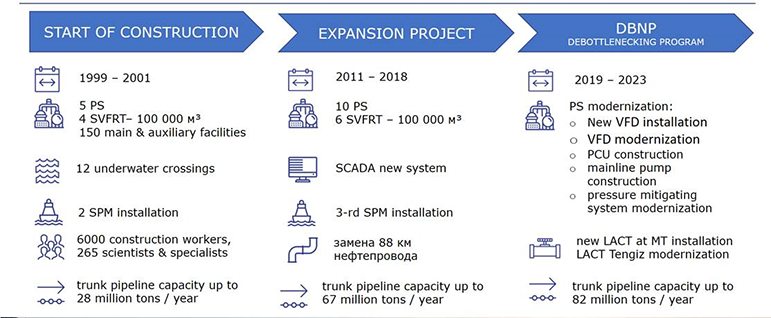CPC Debottlenecking Program (DBNP) is a set of separate projects combined into a single Program implemented in the Russian Federation and the Republic of Kazakhstan with an objective of optimizing the current capacities of CPC Crude Oil Pipeline System. The Program delivery will enable a flexible operation of injection points and allow for transportation of extra crude oil volumes (up to 72.5 MTA in RoK and up to 82 MTA in RF) with an optimal number of DRA at relevant pipeline operating factors. For example: At the CPC Marine Terminal, after the completion of the implementation of DBNP facilities, the maximum loading capacity increases to 33,000 m3/h. The Program also includes a range of projects aimed at improving of CPC Crude Oil Pipeline System reliability level upon crude oil transportation volumes increase.
The Debottlenecking Program logically derives from CPC Expansion Project successfully completed in 2018 and is intended to enhance the shippers’ satisfaction while maintaining the high standards of safety and reliability of CPC Crude Oil Pipeline System.

Crude Oil Shipment
CPC Crude Oil Capacity needs further increase in a view of LLP Tengizchevroil plans to complete expansion of Tengiz field production (Future Growth Project and Wellhead Pressure Management Project) by late 2022 and, as a result, increased shipment of crude oil from RoK. The volumes of injected crude oil have been secured in the Consortium's Shareholders “Ship or Pay” Agreement.
Construction Schedule
Design engineering of all DBNP facilities was done under CPC control. State expert reviews of the projects were successfully completed, all necessary permits were received for the start of construction and installation activities. Major equipment scope delivery has been achieved.
In line with the Shareholders’ nominations, by Y2022 end the Consortium had delivered all DBNP projects critical in assurance of transportation of 82 MTA with the use of DRA. The projects aimed at reduction of DRA consumption, pipeline system reliability improvement, as well as removal of decommissioned equipment and upgrade of CPC SCADA will be performed through February 2026.
Current DBNP Implementation Status
Currently construction and installation works have been completed at most of the pipeline facilities, new equipment has been put into operation, decommissioned has been dismantled, and it is technically possible to increase pumping and shipment to 82 MTA. Work is continuing at the PS-3 and PS-5 (installation of a VFD and SRS tanks) and the Marine Terminal (installation of additional PCU and PDS).
DBNP Funding
The cost of DBNP projects implementation in the Russian Federation and the Republic of Kazakhstan is 599.9 MM USD. The project is being funded from CPC own funds from operating profit.
Social Responsibility
A range of CPC social projects and programs in the Russian Federation and the Republic of Kazakhstan are planned for implementation at the expense of DBNP budget funds. At the moment, the construction of a Youth Home in Atyrau has been completed and the construction of a school has begun there, in the Talgairan microdistrict.
Environmental and Industrial Safety
Environment protection and strict compliance with the environmental protection legislation of the Russian Federation and the Republic of Kazakhstan have become a priority while developing the design solutions. As part of its business concept, the Company recognizes that the value of the human life and health, zero harm to environment is above any economic profit. The works have been planned so that to minimize or fully avoid any negative environmental impact. To achieve this, the Company has completed a rigorous selection of contractors based on the results of which the contracts have been awarded to the best bidders that proven in progress of tender their competence in industrial, fire and environmental safety as well as emergency response. While managing the contractors, the Company adheres to the principles and recommendations of International Association of Oil and Gas Producers (IOGP) through a risk-based approach, leadership and continuous improvement.
Both the well proven technologies and equipment along with the latest international developments in crude oil pipeline transportation will be used in progress of construction. Pre-Start Safety Reviews for all newly installed equipment prior to oil-in is a must for all new DBNP facilities start-up. The process includes a comprehensive review of readiness against all safety aspects: starting with confirmation of applicable engineering disciplines compliance with design through actual verification of required resources availability at work location.
Occupational Health
While implementing DBNP projects, the Consortium has been proving its commitment to high standards in occupational health. CPC pays major attention not only to development of Safe Work Culture within the Company but is following up on forming the conscious safe behavior among the staff of all contractors involved in DBNP projects. Various motivational means are used for contractors’ personnel engagement in the process of improving of corporate goals and values along with their invitation in active participation in safety management.
While performing DBNP work, any CPC or contractor employee still has an unconditional authority to stop any unsafe work. This right further evolved in introduction of observation cards regarding labor conditions and safe work performance. It enabled all CPC and Contractors’ staff to promptly notify all unsafe work conditions, near misses at sites, as well as to make proposals for reducing the impact of hazardous and harmful production factors, improvement of labor conditions which is a key element of preventive risk management measures